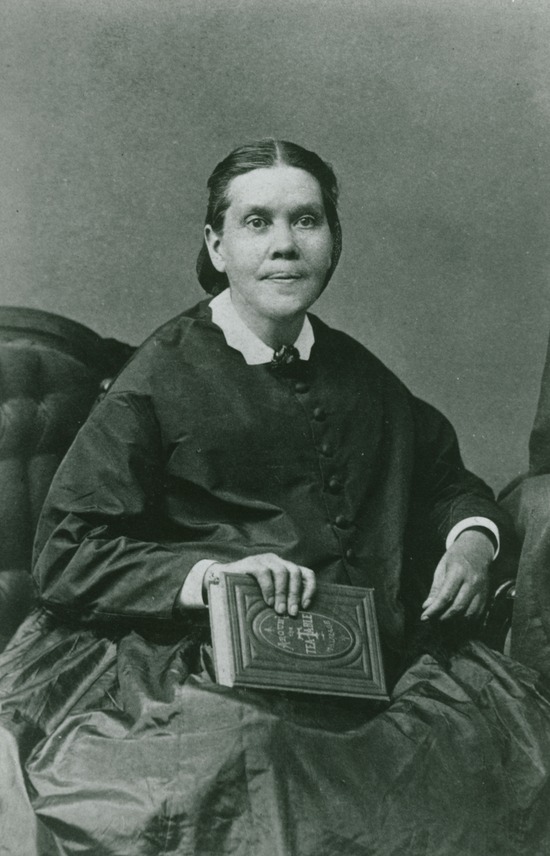Was Everything Ellen White Said Divinely Inspired?
The Seventh-day Adventist Church believes that many of Ellen White’s messages were inspired by God. But that doesn’t mean everything she ever said was prophetic, or meant to be taken as direct instruction from God.
Even so, many of us still wonder how we can distinguish between her personal insights and inspired thoughts, or words that were said to her while in vision from the Holy Spirit.
So let’s break down how to identify the nature of her many written messages and quotes.
We’ll explain:
- What it means to be a messenger for God
- How to distinguish between messages of direct inspiration and common observation/wisdom
- Examples of “sacred” messages, or those directly inspired by the Holy Spirit
- Examples of “common” messages, or those based on Ellen White’s life observations and wisdom from years of significant Bible study and Spirit-led ministry
But let’s start by clarifying what it means to be inspired by God with the prophetic gift. We’ll specifically look at how that would apply to different things prophets say, at different times.
What it means to be a messenger for God
Not everything Ellen White said or wrote was given to her by God in a direct manner.
People who say otherwise about Ellen White—or any true prophet—have a misunderstanding of how divine inspiration is given. This thinking leads people to believe everything a prophet ever says is a divine decree.
But this idea is not supported by the Bible.
Ellen White herself addressed this issue when a fellow church member wrote her a letter, telling her he had been taught to believe that everything she ever spoke or wrote was divinely inspired.
She replied:
“My brother, you have studied my writings diligently, and you have never found that I have made any such claims. Neither will you find that the pioneers in our cause have made such claims.”1
Even though Ellen White cleared up this issue, there are still many people that wonder if this is the case.
After all, wouldn’t it make more sense for God to ensure that everything His prophets said came directly from Him, down to the individual word choice? Wouldn’t that help lessen the confusion readers face when trying to distinguish between inspired and uninspired messages?
The answer to this question has two parts.
Not everything a prophet says is inspired because:
- Prophets are individuals with free will.
- Prophets may be given specific words to relay, but usually they are inspired with thoughts that they are instructed to then share with others (what is referred to as “thought inspiration”).
The first reason not every word a prophet says is divine is because God gave every human being the right to free will and free choice.
Even in a spiritual office as noteworthy as a prophet, these human beings are still free to speak their own thoughts and express their own feelings.
Just look at the way Jonah talked about Ninevah in the Old Testament, even though he knew God wanted to save those people (Jonah 4:1-10). Or how John the Baptist resisted baptizing Jesus in the New Testament because he felt unworthy (Matthew 3:14).
Bottom line—Scripture explains that prophets are still people. They’re individuals responsible for making their own choices.
Some people see this individuality as an obstacle to following God’s will. But God values individuality and can still use individuals to further His plan.
In fact, the individuality of God’s prophets (and followers in general) is God’s way of reaching others in relevant, relatable ways.
This is because divine inspiration isn’t a matter of prophets writing down what God dictated to them word-for-word (except in rare instances), but conveying the concepts God gives them using their own choice of words.
And while prophets are careful not to distort the messages they’re given, they are free to write in a way that will help their readers better understand what God wants to tell them. Some of that might involve the kind of language they write it in, the metaphors or idioms they could use, or that prophet’s individual writing style.
This is how thought inspiration is defined.2
As for the Holy Spirit’s part in this process, He gives prophets a message and helps them see things from a heavenly perspective. The Holy Spirit may do this through visions, dreams, the actions or words of other people, the Bible, or by placing divine impressions or convictions in a prophet’s mind.
Prophets are also able to draw upon their experience with the Holy Spirit to offer intelligent, Bible-based counsel, and make informed decisions.
That means even if a prophet is offering advice without specific instruction from the Holy Spirit, chances are, their advice (if applicable) will still benefit you.
In fact, this sentiment is expressed by the apostle Paul in 1 Corinthians 7:25, when he begins a message with, “I have no command from the Lord, but I do give an opinion as one who by the Lord’s mercy is faithful” (CSB).
Even so, it’s still important to draw the line between divine wisdom and human wisdom so we can better understand how to apply it to our lives.
Distinguishing between sacred and common messages

“Courtesy of the Ellen G. White Estate, Inc.”
Even though Ellen White was responsible for sharing the messages God gave her, there were times when she would make observations about everyday life or respond to subjects that weren’t directly related to religion or spirituality.
Even though she had the prophetic gift, she was still a regular person. She had personal reasons for writing and speaking—whether making a grocery list or writing letters to family—just like any person would.
But even in Ellen White’s time, there were some people who misunderstood how divine inspiration worked. They thought that everything she said had to have been a verbatim message from God.
Ellen White addressed this idea by explaining the difference between subjects that were sacred (a religious concept inspired by God), and those that were common (an everyday comment):
“There are times when common things must be stated, common thoughts must occupy the mind, common letters must be written and information given that has passed from one to another of the workers. Such words, such information, are not given under the special inspiration of the Spirit of God.”
“Questions are asked at times that are not upon religious subjects at all, and these questions must be answered. We converse about houses and lands, trades to be made, and locations for our institutions, their advantages and disadvantages.”
“I receive letters asking for advice on many strange subjects, and I advise according to the light that has been given me.3“
The word “sacred” isn’t insinuating that these particular writings are worshipped or revered above the Bible. It simply means that those messages were about important spiritual topics, in which God provided her with the concepts to discuss and points to make.
Distinguishing between common and sacred writings is the first step in figuring out whether one of Ellen White’s messages is inspired or not.
You can do this by looking at the content of the book or article in question.4
You’ll know she’s speaking with divine inspiration…
- If she said she “was shown” something in a vision
- If she spoke on matters she couldn’t have known or predicted herself
- When she spoke as an authority
- When she rebuked sin (Note: This is different than advice or concern. This would be a calling out of harmful sin among a Christian community).
- When she spoke authoritatively on spiritual matters
You’ll know she’s probably sharing her own insights…
- If she explicitly said she was sharing her opinion
- If she said the Lord hadn’t revealed something to her yet
- When she spoke on common subjects (hobbies, chores, travels)
- When she wrote private letters on common subjects
Let’s look at some examples.
Examples of sacred messages

“Courtesy of the Ellen G. White Estate, Inc.”
Most of Ellen White’s writings were inspired by God. This is particularly the case of the books she published in her lifetime. This includes Testimonies for the Church, Acts of the Apostles, The Desire of Ages, Christ’s Object Lessons, and The Great Controversy. Although she also wrote inspired articles for periodicals like the Review and Herald.
One of her most popular books, The Desire of Ages, shares the insight she received about Jesus’ earthly ministry.
Her books also helped people understand more about key biblical figures, such as Paul, Peter, Daniel, David, Paul, and even the Holy Spirit and Satan.
But even though she would write about Bible concepts or people in many different contexts, not all of them were considered to be directly inspired. She would sometimes speak of biblical topics in her personal writings, such as when she wrote to her children, friends, or acquaintances with general news or advice.
This just goes to show that she was constantly thinking of God and looking for ways to actively serve Him and apply His teachings to her life.
But since talking about the Bible isn’t the sole determining factor of whether or not the messages are coming directly from God, we have to look at other indicators of her sacred writings.
Ellen White mostly shared divine counsel that covered the following areas:
- Bible truths: Whenever Ellen White confirmed Bible truths, she did it under inspiration from the Holy Spirit. She carefully used the insight she received to corroborate the Bible studies of early Advent believers.
This was evident in the way she would confirm or deny issues of doctrine by pointing them back to the matching topic in Scripture, sometimes in several different places. In other words, everything she said about doctrine upheld the Bible and stayed aligned with its principles. And this inspiration was what led the early Adventists to revive key Bible teachings like the Sabbath and Jesus as our high priest.
- Spiritual reproofs: One of the most difficult parts of bearing the prophetic gift is having to alert fellow Christians when they were headed down a harmful or fruitless path. Ellen White would sometimes dread giving spiritual reproof because she was very sensitive to the feelings of others.5
- Instruction on health: Ellen White’s writings on health reform demonstrated impressive knowledge about health principles. She lived in the Victorian era—an age where medicines and common household items were filled with toxic, even poisonous materials. Even the most educated doctors would prescribe medicines with harmful substances.6 And yet, she was still able to distinguish between what was healthful and what was hurtful with God’s guidance.
- Counsel on Adventist institutions: There were many occasions when the General Conference, the administrative body for the Adventist Church, would consult with her on administrative questions. One time, church leaders were asking her where they should establish an Adventist school.
The Church had already picked out a particular plot, but the surveyors they asked to look at it described it as an unfruitful land.7 But Ellen White insisted that God had chosen that land.8 Church leaders bought the land and it grew into a successful college (Avondale) that still exists today.
- Prophecies: All the prophecies Ellen White received and wrote about were from God Himself. His word tells us that the gift of prophecy only comes through the Holy Spirit. We know she had the prophetic gift because there were many things she was shown that she couldn’t have otherwise predicted.
For one, she was shown the dangerous effects of intemperance that were not well known at the time.9 She was also shown that the secession of the southern states would lead to the Civil War.10
She prophesied about a variety of other subjects, but the most prominent visions addressed last-day events and signs of the times.11
Of course, we have to be aware that not everything she wrote was intended to be spiritual counsel. Like any person, she had a life outside of ministry—she still had personal reasons for writings and speaking.
Examples of common messages

Image by Margarita Kochneva from Pixabay
While most of Ellen White’s writings resulted from the spirit of prophecy, she did have other reasons for writing. There were some occasions when she would offer her own advice based on her own experiences, studies, or observations.
Here are some areas where it’s likely she was guided by her personal insights:
- Personal letters on common subjects: Ellen White wrote lots of letters to her friends and family. When she was traveling for the Church, she would send her young sons letters of all she saw on her journey.12 When they grew up, she still wrote to them about all sorts of subjects. On one occasion she wrote her son, Edson, about James White’s health condition and her everyday life.13
- Individual reasoning: When Ellen White spoke of everyday life issues, she was using her own common sense. One time her son Willie asked her if she had any advice for a new school location. And in her response, Ellen White didn’t mention receiving insight from God or being shown a specific location. Instead, she gave him a general answer using her individual reasoning. She told him to look for whatever seemed best to him, but to especially look for a property with a creek.14
- Common conversation: Just like everyone else, Ellen White spent time talking about everyday things. She had interests outside of her spiritual life including her family, her garden, sewing, horseback riding, and so much more! While the word of God was one of her favorite things to talk about, she also enjoyed talking with friends and discussing common interests. She was even known for her sense of humor!15
It’s important to know the difference between Ellen White’s sacred and common writings, because there are some who will mistakenly adhere to the advice she gave in her common writings as if they were commands from God.
At the same time, it’s important not to dismiss something Ellen White said as merely “her opinion,” just because it’s something against our own preferences. After all, the Bible warns not to despise the words of true prophets (1 Thessalonians 5:20-21).
That’s why it’s essential to understand the context of Ellen White’s writings and compare them to the Bible for ourselves. That’s what she would have wanted, anyway!
That way we can determine which counsel was based on her own experience, which counsel was given for a specific place or time, and which divine counsel we can carry with us into the modern age.
And as long as you study them for yourself, compare them to God’s word, and ask Jesus Christ for guidance, you won’t need to worry about misunderstanding her messages.
Roger W. Coon, former associate director of the Ellen G. White Estate, once said:
“Common sense and sanctified reason should be our guides to differentiation between the two categories [sacred and common writings].”16
If you’re looking to study Ellen White’s writings for yourself, the Ellen G. White Estate has preserved and digitized all her works. You can search through them at egwwritings.org.
If you’d like to learn more about biblical prophets in general, check out What Makes a Prophet a Prophet or Prophets of the Bible.
Related Articles
- White, Ellen G., The Review and Herald, August 30, 1906 [↵]
- Douglass, E. Herbert, Messenger of the Lord, pp. 16-17 [↵]
- Ibid., p. 37 [↵]
- Ibid., p. 174 [↵]
- Ibid., p.157 [↵]
- https://www.mentalfloss.com/article/550867/dubious-victorian-cures-first-merck-manual-diagnosis-and-therapy. [↵]
- Douglass, p. 190 [↵]
- Ibid. [↵]
- Ibid., p. 365 [↵]
- Ibid., p. 158 [↵]
- Ibid. [↵]
- White, Ellen G., I’d Like to Ask Sister White, p. 105 [↵]
- White, Ellen G., Letters and Manuscripts, vol. 8., Letter 201, (1903) [↵]
- White, Ellen G., Letters and Manuscripts, vol. 9., Letter 144, (1894) [↵]
- Douglass, p. 94 [↵]
- Coon, W., Roger, “Distinguishing Between the Sacred and the Common,”https://mail.google.com/mail/u/0/?tab=rm#search/tim/KtbxLxgNNvWTNRXdtpCsXCwdsqhKGJtvlq?projector=1&messagePartId=0.1. [↵]
Questions about Adventists? Ask here!
Find answers to your questions about Seventh-day Adventists
More Answers
Why Many Seventh-day Adventists Choose a Vegetarian Diet
Why Many Seventh-day Adventists Choose a Vegetarian Diet?You may have an Adventist friend who is vegetarian, or maybe you’re attending a Seventh-day Adventist Church for the first time and notice the potluck doesn’t have any meat. This isn’t unusual in Adventism. In...
The Health Benefits of Fresh Air You Should Know About
The Health Benefits of Fresh Air You Should Know About“When you can’t breathe, nothing else matters,” the American Lung Association tells us. And while that’s true, the kind of air you’re breathing will determine the health benefits you experience. Breathing fresh...
What Do Seventh-day Adventists Choose to Eat?
What Do Seventh-day Adventists Choose to Eat?Food blogs overwhelm the internet; food fads are all the rage; and copycat and healthy versions of food are the subject of many a get-together. Eating—and eating the best way—is a big deal. And everybody has a different...
10 Incredible Ways Sunlight Can Improve Your Health
10 Incredible Ways Sunlight Can Improve Your HealthAre you concerned about sunlight’s negative effects? You might be the one who lathers on the sunscreen and covers up when you go outside. Or maybe you avoid being outside as much as possible. You might be surprised,...
Why Is Water So Important?
Why Is Water So Important?We all know that water is a substance we can’t live without. It quenches our thirst and keeps us hydrated on the inside. And it’s necessary for hygiene and cleansing on the outside too. But did you know that the cleansing properties of water...
Ellen White’s Writings and the Adventist Health Message
Seventh-day Adventists are known for their emphasis on healthy living. And Ellen G. White was a significant influence in the development of this priority and practice among Adventists.
Health Clinics
Ellen White and Adventist Healthcare—Ahead of Their Time Medical care in the mid-1800s was primitive, to say the least. Basic concepts we take for granted—such as proper handwashing or recognizing the dangers of bloodletting—were nonexistent. And doctors often had...
What Did Ellen White Teach about Vegetarianism?
What Did Ellen White Teach about Vegetarianism?One thing you might have heard about Seventh-day Adventists is their emphasis on a vegetarian lifestyle. If you’re wondering why that is, it goes back to our church’s humble beginnings: As Adventists studied the Bible,...
How Ellen White’s Teachings Can Improve Your Health
How Ellen White’s Teachings Can Improve Your Health Healthcare in the nineteenth century was said to leave “more disease than it took away” with its use of bloodletting and “medicines” like mercury and arsenic.1 As people questioned these methods, new approaches...
Change Your Perspective on Life with These 5 Mindsets
5 Biblical Mindsets to Change Your Life for the Better Sometimes, life is just plain hard. There’s no way around it. So would thinking about things differently really change anything? Our perspective on life, and everything it throws at us, affects more than we’re...
Bible Promises for When You’re Worried or Fearful
Bible Promises for When You’re Worried or Fearful The Bible is full of beautiful promises that can comfort us in a variety of situations. They can give us hope when we are hopeless, make us feel grateful for God’s love, and comfort us when we’re grieving or suffering....
12 Practical Ways to Overcome Worry
12 Practical Ways to Overcome Worry DISCLAIMER: This content is for informational purposes only. It does not constitute any professional medical advice and is not intended as a substitute for professional mental health therapy. It’s easy to get stuck in a cycle of...
How the Bible Talks About Worry, Fear, and Anxiety
How the Bible Talks About Worry, Fear, and Anxiety Worry and fear are the ingredients of anxiety. It’s easy to see how the world isn’t perfect—and the anticipation of a bad event or experience (that may or may not even happen) can end up draining the peace and...
How to Calm Anxious Thoughts, Using the Bible
How to Calm Anxious Thoughts, Using the Bible You were expecting a phone call from your daughter half an hour ago, and she still hasn’t called. She’s also not answering your calls. You feel your heart thumping as your thoughts race: What if she’s been in a car...
What You Should Know About the Adventist Health Studies
What You Should Know About the Adventist Health StudiesYou may have heard that Seventh-day Adventists care about health. But what you may not know is that Adventists have been the subjects of long-term research into lifestyle and health. Since 1958, researchers from...
Benefits of Sunlight
Yes, There Are Health Benefits of SunlightDespite the bad reputation it’s gotten, sunlight is generally associated with positivity, as shown by songs like “You Are My Sunshine,” or phrases that refer to delightful people as having a “sunny disposition.” There’s a...
Why Your Body Needs Rest for Optimal Health
Why Your Body Needs Rest for Optimal HealthStruggling to think straight? Wondering why you can’t remember that important tidbit you heard earlier today? Feeling like your emotions are about to explode? These are just some of the symptoms that can reveal your need for...
The Seventh-day Adventist Diet: One of Our Key Longevity Secrets
The Seventh-day Adventist Diet: One of Our Key Longevity SecretsOats, avocados, lentils, tofu—probably not what you first think of in a standard American diet. But if you show up at the home of an Adventist, chances are you may be served one of these staples. Out of a...
Why You Need Fresh Air
Why You Need Fresh Air“When you can’t breathe, nothing else matters,” the American Lung Association tells us. We couldn’t agree more! Breathing in clean air is an essential part of caring for our bodies, which God has given us. Together with other health principles,...
Sabbath Meal
Everything You Need to Know About Sabbath MealsFor Seventh-day Adventists, sharing a Sabbath meal with friends and family is one of the most special and memorable parts of the Sabbath. That’s why we want to share with you all about Sabbath meals and why they’re such a...
Adventists and Healthy Living
Adventists and Healthy LivingWhat’s the Adventist “Health Message” All About? One thing Seventh-day Adventists are known for is their emphasis on living healthy lives. Since our bodies are living temples of the Holy Spirit (1 Corinthians 6:19, 20), we strive to stay...
Water’s Importance—Physical Benefits and Spiritual Applications
Water’s Importance—Physical Benefits and Spiritual Applications We all know that water is a substance we can’t live without. Not only does it quench our thirst and keep us hydrated from the inside, but it’s necessary for hygiene and cleansing on the outside as well....
How Important is a “Day of Rest?”
How Important is a “Day of Rest?” Why God Created a Day for Downtime by Martin Casper Do you ever experience the feeling of complete overload? Do you feel like the only way you can get ahead is by slamming it 24/7? I hear these types of comments more and more...
7 Reasons Why a Day of Rest is Important
7 Reasons Why a Day of Rest is ImportantWe live in a fast-paced world. It seems as if success is measured in how much you can do in a short amount of time. (Extra points for the service or product that is available 24/7). The idea that we will be more successful if we...
How do Adventists choose what to eat?
How do Adventists choose what to eat?Every day, parents go through the ritual of getting their kids to eat what is healthy and good while trying to steer them away from what can hinder the growth of their developing bodies. Nutritionists work with their clients to...
How Can I Have a Better Marriage?
Is it possible to have a happy marriage?
Why are many Adventists Vegetarian?
Why are many Adventists Vegetarian?The diet intended for man is outlined in Genesis 1:29, “And God said, ‘See, I have given you every herb that yields seed which is on the face of all the earth, and every tree whose fruit yields seed; to you it shall be for food.’”...
Didn’t find your answer? Ask us!
We understand your concern of having questions but not knowing who to ask—we’ve felt it ourselves. When you’re ready to learn more about Adventists, send us a question! We know a thing or two about Adventists.
























